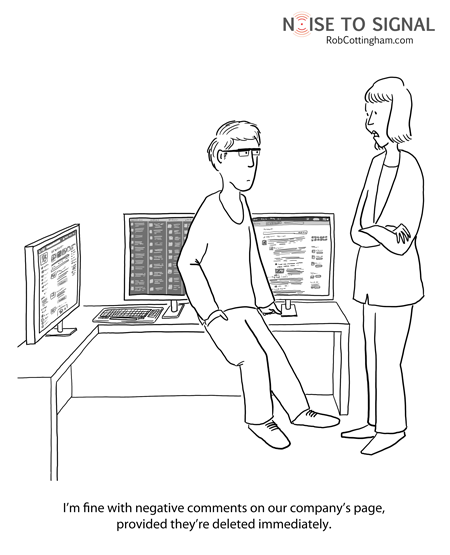- Home
- Blogs
- Rob Cottingham's blog
- Don't delete online criticism. Embrace it.
A thicker skinDon't delete online criticism. Embrace it.
- 5 November, 2011
- 3 comments

So it’s happened again: a company comes under fire for some misdeed — perceived or actual — and gets a few critical comments on their Facebook Page. And their crisis communications strategy is to pour gasoline on that little flame by deleting those comments.
The latest folks to do this are the people at ChapStick, who ran a print ad that offended a few folks. Those critics posted their complaints on ChapStick’s Facebook page (most of them quite civil). ChapStick’s page administrators then deleted the comments; this case adds an ironic new wrinkle because of the ad copy pointing people to their Facebook presence, which reads “Be heard.”
After enduring a torrent of criticism for deleting the criticism, ChapStick posted an apology for the ad and a sort-of explanation for deleting the comments, saying they follow Facebook guidelines and “remove posts that use foul language, have repetitive messaging, those that are considered spam-like (multiple posts from a person within a short period of time) and are menacing to fans and employees.” Which, with most of the comments, wasn’t the case.
It seems to bear repeating: brands, learn to take some criticism on your social web presences. Why? Because…
- Accusations of suppressing those comments are often more damaging than the original criticisms themselves.
- The presence of critical comments gives the conversation happening on your Facebook Page, blog or other presence a sense of authenticity. That means the positive user comments carry more weight than they would if your site had nothing but obsequious flattery.
- A critical comment can be an opportunity for engagement on your part. It’s your chance to answer a criticism, resolve a complaint, correct some misinformation. And you may be catching a little issue before it becomes a much bigger one.
- A critical comment can be an spur to participation and conversation by your community. Let’s face it; for most brands and organizations, excess participation usually isn’t the problem with their Facebook pages.
So maybe it’s time to learn to love the negative. A thicker skin not only saves you from the sting of a little criticism; it can let you realize from genuine benefit… and keep you from becoming the latest high-profile case study in why comment deletion can backfire.



Comments
Lee Down says
I run a number of pages, and one in particular is rather large and active. On occasion I post a statement that I pull out of whatever thoughts might be occupying my time. Ironically, there have been occasions where people have taken issue with something I posted. I'm always surprised, particularly since nothing I do on that page is meant to be derogatory when I post it. But like you've said, once people start posting their criticism, it begins a very active thread of participation from the crowd, both good and bad. What a great sign that is; to see that the page is being seen, is being read regularly, and appreciated enough for people to get involved with controversy.
Lucid Gal says
People who make negative comments on your blog or Facebook page are 1) giving you an opportunity to show how great you are in the way you answer a complaint, or 2) showing themselves to be jerks, causing your fans to rally to your side. More at http://www.getlucid.net/2010/09/i-hate-you-and-5-reasons-you-really-shouldnt-mind/
Leah Mackey says
Thank you for this post. I am sharing with my team and also some of my clients who still don't quite "get it."